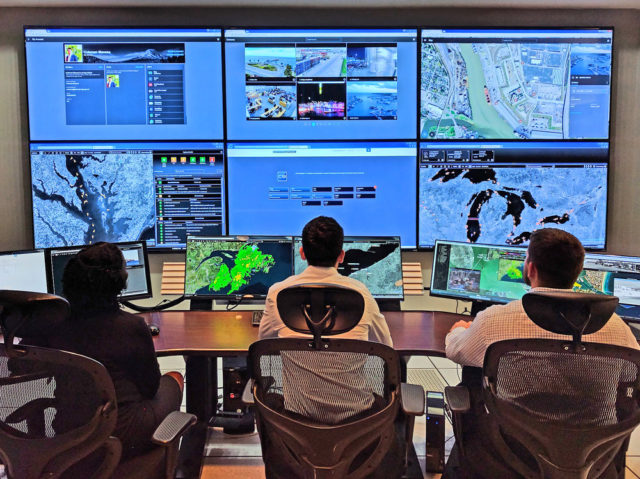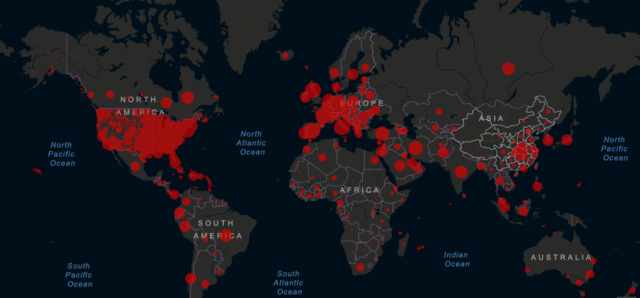 COVID-19 has changed our perspectives on a lot of things. The need to work from an office five days a week and what the definition of “critical business travel” really is. While we were all focusing on response and “Work from Home” arrangements, COVID-19 may have just claimed its next victim – Crisis Command Centres.
COVID-19 has changed our perspectives on a lot of things. The need to work from an office five days a week and what the definition of “critical business travel” really is. While we were all focusing on response and “Work from Home” arrangements, COVID-19 may have just claimed its next victim – Crisis Command Centres.
With social distancing measures firmly in place, the idea of congregating to respond was far from every leaders’ radar. The uptake and usage of virtual critical event managment systems like CQ, supported further by the on-boarding of millions of zoom users has brought forward the realisation that Command Centres are no longer as relevant in today’s corporate environment.
There are some key observations from 2020 that severely diminish the value of Command Centres as an effective response investment:
1. Crisis events can be prolonged. When teams are stood up for long periods of time, fatigue and burn out becomes prevalent. The Command Centre environment is taxing, relative to supporting teams whilst responding from a home office. Supporting teams with a way to centralise their coordination from home becomes an asset to the longevity of an effective response.
2. Corporate Governance is key. Crisis events that have a major human impact require strong governance and reporting. Tracking decisions and respective information as an event unfolds is crucial when a review eventually takes place, or is requested by regulators or other. Even in a boardroom environment, information can pile up and get lost. Whiteboards fill and photos of whiteboards get stored in some unknown location.
3. The IT Infrastructure landscape has changed. Pre COVID-19, many organizations did not have the IT infrastructure available to rapidly set up and respond in a WFH environment. This naturally elevated the value of a turn-key environment where IT infrastructure is ready and waiting. COVID-19 has changed the IT infrastructure landscape forever, forcing most business into upgrading their hardware and software capability to support the majority of their workforce.
4. Cost. COVID-19 just put the blow torch on every corporate budget on planet earth. Command Centres are an expensive luxury that may not be afforded to the next generation of leaders as crisis software continues to come in at a fraction of the cost.
5. Agility. The days of having all leaders available in one place at one time to respond are long gone. Even before COVID-19, many CMT members were either located in different regions permanently, or in different time zones on travel. The ability to connect strategic and operational response teams, regardless of location has been forced with WHF. This need will continue as our working landscape continues to evolve post recovery into a new norm.
 COVID-19 is not the first event however to raise the question of the effectiveness of Command Centres in the corporate environment. On March 15, 2019 as the tragic events of Christchurch’s mosque shootings unfolded, a city wide lock down quickly ensued.
COVID-19 is not the first event however to raise the question of the effectiveness of Command Centres in the corporate environment. On March 15, 2019 as the tragic events of Christchurch’s mosque shootings unfolded, a city wide lock down quickly ensued.
As response teams looked to activate their Command Centres, many were left dormant and ineffective due to the very restrictions imposed to preserve safety.
This offsite response strategy was brought to an instant standstill. Teams that had activated response software like CQ were online in minutes, communicating a message of lockdown with thousands of stakeholders.
My very own response to that tragic event began in a Brisbane café from my Iphone, followed shortly thereafter from my office ensuing further from the home office that evening.
As organizations now go through a post-incident review of their COVID-19 “initial response phase”, we’re seeing a greater question on the corporate Command Centre budget placement and where this could have been better spent to support the organization. Broader and deeper training programs? Critical event management Software? IT infrastructure to support WFH? With 2020 hindsight, where would you direct your spend?
Is there a role for Command Centres at all? Yes. Command Centres do have a place as they continue to provide emergency services significant value in collaborating in complex multi-agency response during major events and crisis situations. Critical Infrastructure also benefit due to the heavy reliance on proprietary systems.
In the corporate environment however, there is a big question mark on their effectiveness. It’s becoming clear that there is room to re-think this strategy, evolve our method of collaborating in line with a new normal, forced by COVID-19.
If there is a silver lining in this worldwide crisis, it is the learnings we can take from it to improve our resilience for tomorrow.
By Marcus Vaughan
Chief Growth Officer, Catalyst Technologies
Subscribe to our mailing list to receive content like this direct to your inbox














